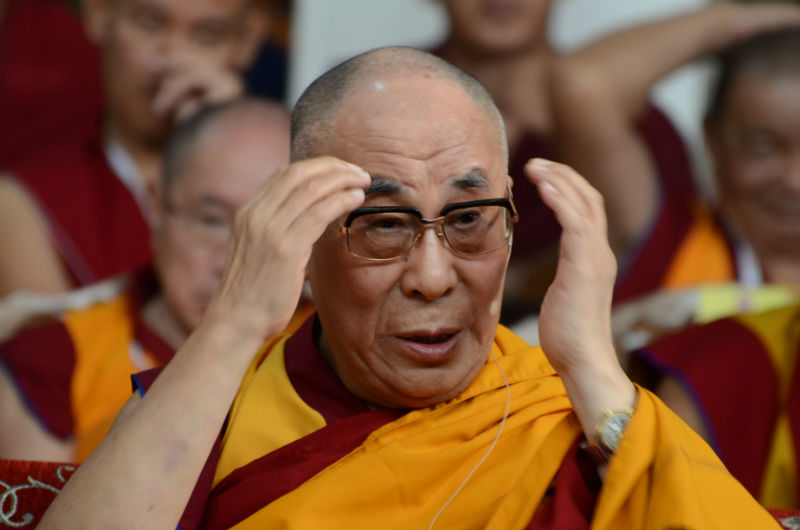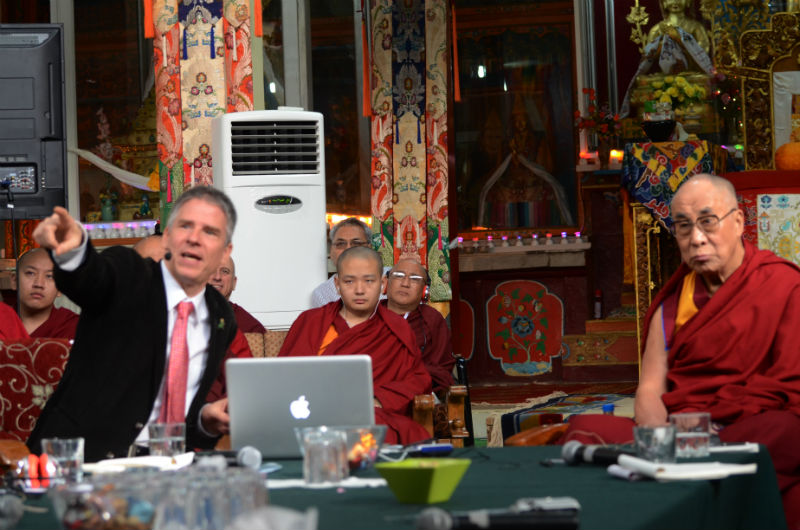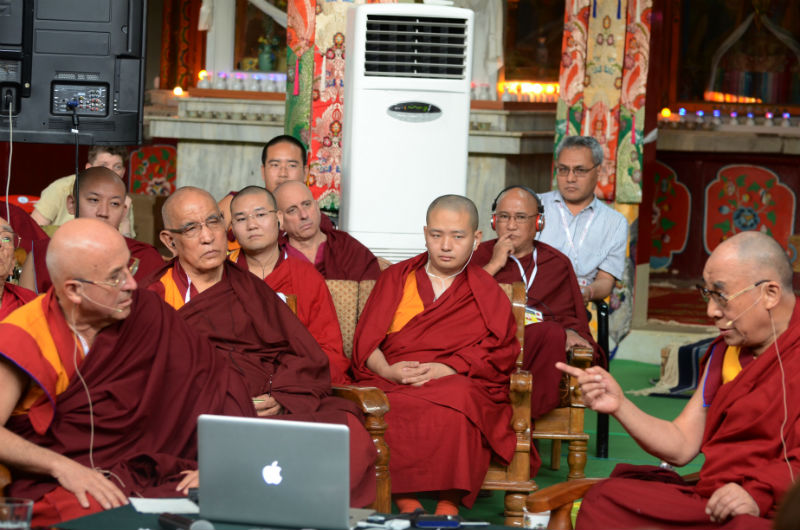Mundgod, Karnataka, India, 20 January 2013 –The spiritual leader of Tibet, His Holiness, the Dalai Lama keenly participated in all the sessions while several scientists and scholars made their presentations at the Drepung University in Mundgod, Karnataka State, South India.

The tail-end of the afternoon sessions were given to the audience to interact with the speakers. Several thousand monks have been following the proceedings and an opportunity was given for nuns to meet and hold discussions with the female scholars and scientists in the Mind & Life group.
The main topic for the day was the nature of consciousness and His Holiness the Dalai Lama asked discerning questions that livened up the discussion. Christof Koch, who has pioneered the scientific investigation of consciousness, acknowledged that he belonged to a tradition that included Plato, Descartes, Darwin and his own mentor, Francis Crick.
His Holiness said, "We take a physicalist approach to investigating the world. In the empirical examination of nature, theories have to be testable. Quantum mechanics has nothing to tell us about consciousness neither does the periodic table of elements." There is no question of what it feels like to be a radio, for example, and yet the brain has consciousness.
The Nobel Peace Prize lureate called this the explanatory gap. The motto under which he is pursuing the science of consciousness is a quotation from Galileo, 'Measure what is measurable and make measurable what is not.' In attempting to do this, distinction is made between the state of consciousness and its content.

What do we know about consciousness? It is associated with some complex biological networks, but, our immune system functions without it. Our liver and other complex organs function without consciousness.
His Holiness asked at what level we find the basis of consciousness and Christof answered that we can speculate, but we do not know. "Consciousness does not require language or self-consciousness.
All mammals have consciousness. The brain tissue of human beings, mice and dogs is very similar, the mechanism of the brain is similar too, and the difference seems to be size. A bee has a small brain, which is far more complex than the average animal.
Maybe all biological creatures with a brain are conscious, we don't know." Christof said that people were looking for the footprint of consciousness in the brain in the labs. We cannot conceive how there can be consciousness with no brain or when the brain is dead - as we say 'No brain, never mind.' We love machines; I wonder if we can make one that knows what if feels like to be a machine? If we can, it will help us measure consciousness."
Mathieu Ricard, a Buddhist monk with scientific training offered a Buddhist perspective on consciousness. He said the Buddha tried to bridge the gap between the way things appear and the way they are. The truth he found was almost impossible to express in words. He did not teach this is the truth, take it or leave it. Instead, he said, here's a map, follow it; this is what I have understood.
Things don't arise without a cause, Mathieu reminded his listeners, and therefore, we say that a moment of consciousness is preceded by another moment of consciousness. Within our minds we see thoughts, memories and a basic faculty of knowing. Accomplished practitioners speak of clear, vivid awareness.

Mathieu cited three sources of information that have an interesting bearing on the nature of consciousness. The first was the work of Ian Stephenson, a scholar at Virginia University who collected stories from across the world of people who had memories of previous lives.
His Holiness kept and published only those that could be explained in no other way. The second source is people who have had and reported near death experiences, while the third are instances in which there seems to have been mind to mind communication. Mathieu told a story from his own experience.
Having spoken about two Indian girls he had met with clear recollection of their former lives, His Holiness also mentioned that he had once remarked to his senior tutor, with whom he was very close, that he seemed to have moments of clairvoyance and Ling Rinpoche replied, "Yes, it sometimes happens." Added to which is the fact that he later spent 13 days in posthumous meditative absorption.
When Christof asked if the subtle mind is only accessible to accomplished practitioners, His Holiness responded, "The subtle mind is the basis of mind. The co-operative cause of mind is the human body, but the substantial cause is consciousness."
In the afternoon session, Rajesh Kasturirangan and Michel Bitbol expressed their views on the subject. Summing up the day's energetic discussions, Arthur Zajonc said, "I hope we come to a point where we can be agnostic about the substrate of consciousness."
His Holiness commented, "This is wonderful; real discussion. I have nothing special to add, but I really enjoyed this frank exchange. If everyone simply agrees and approves of what is said, we don't move forward."